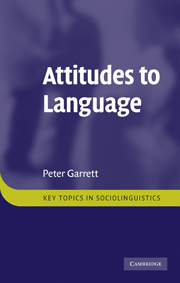Book contents
- Frontmatter
- Contents
- List of figures
- List of tables
- Acknowledgements
- 1 Introduction
- 2 Fundamentals of language attitudes
- 3 Main approaches to the study of language attitudes
- 4 Matched and verbal guise studies: focus on English
- 5 Matched and verbal guise research in more contexts
- 6 Attitudes to speech styles and other variables: communication features, speakers, hearers and contexts
- 7 Communication accommodation theory
- 8 Language attitudes in professional contexts
- 9 Societal treatment studies
- 10 Direct approach
- 11 Folklinguistics
- 12 An integrated programme of language attitudes research
- 13 Conclusion
- Glossary
- References
- Index
- References
5 - Matched and verbal guise research in more contexts
Published online by Cambridge University Press: 05 June 2012
- Frontmatter
- Contents
- List of figures
- List of tables
- Acknowledgements
- 1 Introduction
- 2 Fundamentals of language attitudes
- 3 Main approaches to the study of language attitudes
- 4 Matched and verbal guise studies: focus on English
- 5 Matched and verbal guise research in more contexts
- 6 Attitudes to speech styles and other variables: communication features, speakers, hearers and contexts
- 7 Communication accommodation theory
- 8 Language attitudes in professional contexts
- 9 Societal treatment studies
- 10 Direct approach
- 11 Folklinguistics
- 12 An integrated programme of language attitudes research
- 13 Conclusion
- Glossary
- References
- Index
- References
Summary
This chapter looks at further work within the matched guise/verbal guise tradition, embracing a greater range of contexts, languages and language varieties than chapter 4. It also continues to introduce and highlight methodological innovations and developments that have occurred within this approach, and also to point to some key theoretical issues relating to the language attitudes field. The significance of context is highlighted, as well as the related notion of ethnolinguistic vitality.
A SEMINAL STUDY: FRENCH AND ENGLISH IN CANADA
The seminal study in the matched guise tradition was conducted by Lambert, Hodgson, Gardner and Fillenbaum (1960) in Montreal: ‘a community whose history centers in a French–English schism which is perhaps as socially significant for residents of the Province of Quebec as that between the North and South is for Southerners in the United States’ (p. 44). Two groups of respondents, one English-speaking and the other Canadian French-speaking, heard audio-recordings of four bilingual speakers reading a passage in English and French. The respondents were reminded how we form impressions of people we hear on the telephone or radio, and were accordingly asked to rate the speakers on fourteen traits: height, good looks, leadership, sense of humour, intelligence, religiousness, self-confidence, dependability, entertainingness, kindness, ambition, character and likeability on a six-point scale. The main findings, for our purposes, were that the English Canadians evaluated the English voices more favourably than the French voices on most traits. Against expectations, the French Canadians also evaluated the English voices more favourably than the French voices.
- Type
- Chapter
- Information
- Attitudes to Language , pp. 70 - 87Publisher: Cambridge University PressPrint publication year: 2010



